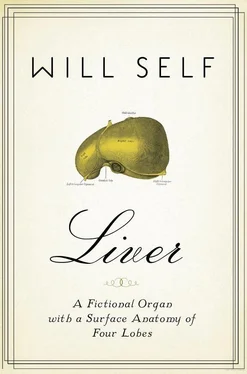I say, surely it’s a question of scale? Looked down on from a mile up in the sky — the holding pattern of a god — this air terminal is a body, the living tissue of which is bored into by bacterium planes, subterranean trains and hissing buses. Humans swarm through its concourses, virions with credit cards.
Soon, I — some of us — will be thrust into that steep vantage, the sky, then propelled over land and sea to another city; Helsinki, as it happens. Before I go, let me — us — tell you how this has come to pass; let me tell you about this generic Tuesday afternoon — because, let’s face it, it’s always Tuesday afternoon. Allow me to assemble a cast of characters, as well or as woodenly drawn as any in a whodunnit. They were all my accomplices; your task is to identify the victim.
November 1998, a Tuesday — the day teetering on noon’s fulcrum. Georgie Maxwell was walking along the first stretch of Kensington Road; she passed the gates at the end of Kensington Palace Gardens and then the driveway of the Royal Garden Hotel. In the fluffy onset of a fine drizzle, the hotel doormen moved smartly to marshal brass luggage carts and beckon taxis beneath the jutting portico with its inset lights haloed in the damp gloom. Over the shoulder of the hotel — a 1960s thing, granite-faced and angular — stretched the late autumn brownery of Kensington Gardens, and beyond them, Hyde Park, its black tree spars rigged with dead and dying leaves. In the middle east a dark mauve sky, its fundament coiled with ashen clouds, squatted over Bayswater.
Walking is perhaps an overstatement. Georgie’s progress was halting, despite her being encumbered with no more than a tabloid newspaper, a pint carton of semiskimmed milk and a packet of milk chocolate HobNobs, all in a plastic bag. She clunked from stiff leg to stiff leg, swinging them from her hips as if they were stilts. The hem of her skirt rose first above one thickly bandaged shin, then the other. The skirt, eh? Well, it had a Minoan motif worked into it — geometric designs embroidered with gold thread; once pale green, it was now stained and blotchy. People walking in the other direction, from Kensington Gore, didn’t take in the skirt, or the rusty raincoat, or the espadrilles unravelling from both swollen feet. They merely checked her against their internal list of street people — alcoholics, junkies, schizos and dossers — made a positive identification, then dismissed her from view.
Up close, and personally, Georgie smelt of sepsis. There were open sores under the chicken skin of her crêpe bandages; craters, really, in which bacteria, numerous as Third World miners, hacked at the exposed tissue-face. Thankfully, the day was fresh, and neither the hurrying working girls nor the strolling young ladies out shopping could smell this. However, besides looking crazy Georgie talked to herself: a twittering commentary in real time — ‘She’s crossing the road, pelican crossing, not a game bird, crossing the road’ — that kept her company as she did, indeed, cross the road at Palace Gate, stump back along the far side, then traverse the junction of Gloucester Road and turn left into De Vere Gardens.
Why did this street — no different to scores of others in the area — feel quite so bare, so baldly threatening? On either side magnolia-painted six-storey Victorian terraces loomed in the thickening drizzle; the pavements were anthracite glossy, void of any rubbish, or even the occasional bracelet — or tiara — of costly dog shit. The kerb sides were cluttered with tens of thousands of pounds’ worth of cars — cetacean Porsches and squashed Maseratis with Dubai plates — and, as she peg-legged by these, Georgie kept up her rap, a well-spoken psychosis, ‘Maybe he’ll be there — maybe he’ll come soon. Maybe-baby, if I don’t TREAD ON THE CRACKS!’ She shied away from the spear tips of the railings, then, halfway along the street, lurched towards them and, pushing open a gate, awkwardly descended an iron staircase into a savage little area full of bullying bins.
I — we went along for the ride — although we were also waiting inside.
*
Inside Billy Chobham, who, in turn, was inside the bath; which was inside the bathroom; which, in turn, was inside Tony Riley’s basement flat. The cell-like bathroom had no windows, and only a single lightbulb that dangled, unshaded, from a furred flex. The harsh light beat the limpid surface of the bath water, below which Billy’s pubic hair bloomed, silky as pond algae. The bath water had long since cooled — Billy was colder. He’d been in there for over an hour, his fair skin going blue, the ends of his fingers puckering up into corrugated pads. However, Billy was experiencing no discomfort, because, unlike the chaotic Georgie, he had had a get-up hit. Billy always had a get-up; this was part of his professionalism. ‘I’m a junky,’ he’d tell anyone unable to escape. ‘I don’t make any bloody bones about it. I don’t try an’ stop, an’ I ain’t sayin’ it’s not my fault neevah — I wanna be a junky. I like being a junky — I’m good at it.’
It’s debatable whether it’s possible to be good at being bad, and it’s a discussion I — we — would be happy to join in. This being noted, let’s not trouble with the theory for now, and instead present the actuality. Billy had jeans that stood up straighter without him in them, and a red mohair pullover given to him by a girl in East Sheen. If he was shod it was in prison-issue trainers. He had no fixed abode, but throughout London — and still further afield, in Reading, Maidstone and Bristol — there were small caches of his belongings: a T-shirt here, a paperback there, an exercise book full of mad ballpoint drawings of invented weaponry way over there. Billy never asked the occupants of the flats and houses where he crashed if he could leave these things; he just shoved them down the back of shelves or into cupboards, so that he could return days or months later and clamour to be readmitted, on the basis that ‘I’ve gotta get me fings.’
There were warrants out for Billy from Redbridge to Roe-hampton for crimes beneath petty: kiting ten-quid cheques, exchanging shoplifted underwear at Marks and Spencer, forging methadone prescriptions. There was nothing aggressive in Billy’s felonies; he took no part in the great metropolis’s seven and a half million fuck-offs, the abrasive grinding of psychic shingle on its terminal beach. Be that as it may, wherever Billy went, doors came off their hinges, baths overflowed and fat-filled frying pans burst into flame. His life was a free-pratfall, as, flailing, head over tail, he plunged through year after year, his fists and feet — entirely accidentally, you understand — striking mates, siblings, the odd — very odd — girlfriend, but mostly his old mum, who, while fighting depression, did the payroll for a chemical plant in St Neots and remained good — or bad — for a loan.
Billy, the career junky, always had his get-up: the brown-to-beige powder in the pellet of plastic, which — after being tapped into a spoon, mixed with water and citric acid, heated, then drawn off through the cellulose strands of a bit of a cigarette filter — was thrust inside his veins, making it possible for the muzzy show to go on. Locked in bathrooms with taffeta mats, crouching in back of couches, planted in the bushy corners of conservatories — Billy stayed in these spaces for as long as it took, watching for the bloom in the hypodermic syringe, his gift of a houseplant.
Georgie, who had forgotten her key, tapped on the glass panel of the kitchen door. Her face was a sharp, feline triangle, tabby with dirt and misapplied make-up; her taps were as diffident as the blows of velvet paws. No one heard her. In the cold bath, Billy gouched out, sunk in the hot Mojave desert of his habitual reverie, a corny old Blake Edwards vehicle for the comedian Peter Sellers called The Party .
Читать дальше












